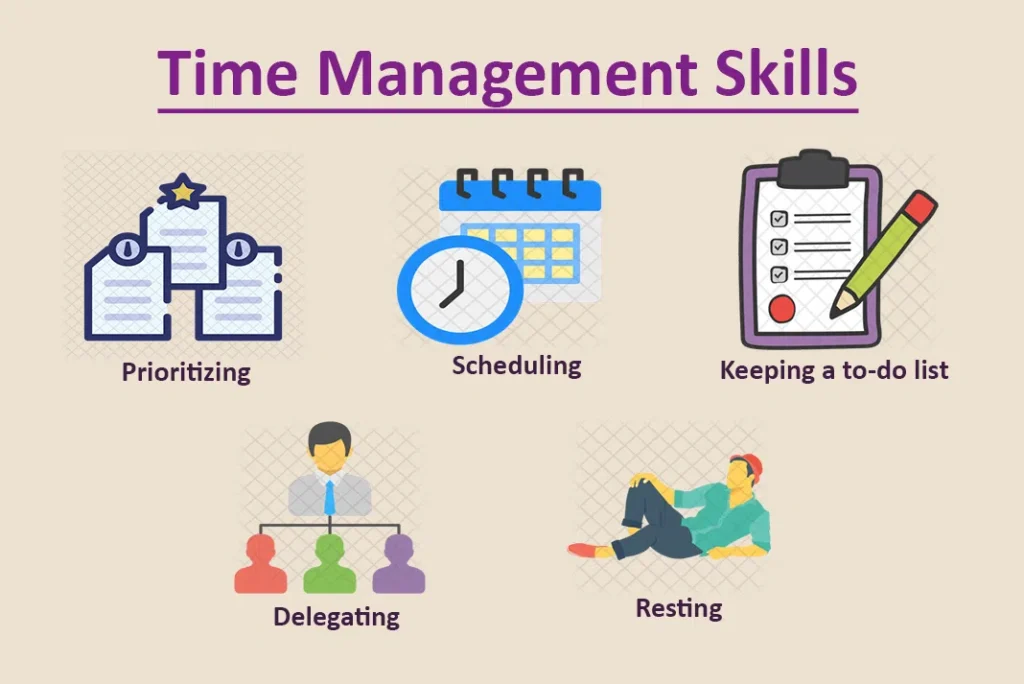Time Management Techniques to Enhance Personal Development

In today’s fast-paced world, the ability to manage one’s time effectively has become more crucial than ever. Time management, the art of organizing and planning how to divide your time between different activities, is not just about finding more hours in the day; it’s about making the time we have work to our advantage. This skill is paramount for personal development, as it can dramatically enhance productivity and stress management, leading to a more fulfilled and balanced life. Understanding and applying time management techniques can make the difference between feeling perpetually behind and having the confidence to meet challenges head-on.
This article will delve into the importance of time management, outline the key skills needed to manage time effectively, and provide strategies for incorporating these practices into one’s personal development journey. Readers will discover how to integrate time management into their daily lives, improving their ability to achieve goals and unlock their full potential.
The Importance of Time Management
Table of Contents
Toggle
Time management is a crucial skill that can significantly contribute to personal and professional growth. It allows individuals to effectively allocate their time and resources, leading to increased productivity, reduced stress, and a greater sense of accomplishment. By mastering time management techniques, one can experience numerous benefits across various aspects of life.
Benefits for Personal and Professional Growth
1) Improved Productivity: Effective time management enables individuals to estimate the time required for specific tasks and accomplish them within the allotted time frame. This leads to increased productivity, as tasks are completed efficiently without unnecessary delays or procrastination.
2) Reduced Stress and Overwhelm: When time is managed effectively, individuals can stay on top of their responsibilities without feeling overwhelmed. This helps mitigate stress and allows for a more balanced and fulfilling life.
3) Better Work-Life Balance: Good time management skills enable individuals to prioritize tasks and allocate time for both work and personal commitments. This balance is essential for overall well-being and personal growth.
4) Increased Focus and Quality Output: By minimizing multitasking and distractions, time management techniques help individuals maintain focus on the task at hand. This results in higher-quality work and increased job satisfaction.
5) Accomplishment of Goals: Effective time management allows individuals to break down larger goals into manageable tasks and allocate time accordingly. This systematic approach increases the likelihood of achieving personal and professional objectives.
6) Personal Responsibility and Accountability: Time management fosters a sense of personal responsibility and accountability. Individuals become more aware of how they spend their time and can make conscious efforts to improve their habits and routines.
Common Misconceptions
While the benefits of time management are well-established, there are some common misconceptions that should be addressed:
1) Completing All Tasks: It is unrealistic to expect that all tasks will be completed at once. Time management is about prioritizing and focusing on the most important tasks, not necessarily completing everything on a to-do list.
2) Uninterrupted Focus: The notion that productivity and creativity require hours of uninterrupted focus is a myth. In reality, routine and consistency in achieving daily goals are more effective strategies.
3) One-Size-Fits-All Techniques: There is no single “magic bullet” for time management. Different techniques and strategies may work better for different individuals based on their unique working styles, dispositions, and circumstances.
By understanding the importance of time management and dispelling common misconceptions, individuals can embark on a journey of personal and professional growth, unlocking their full potential and achieving a more balanced and fulfilling life.
Key Time Management Skills

Effective time management requires mastering several key skills that enable individuals to allocate their time and resources efficiently. These skills are essential for achieving personal and professional goals while maintaining a healthy work-life balance. Two critical time management skills are prioritization and delegation, as well as goal setting and planning.
Prioritization and Delegation
Prioritization is the foundational skill needed for gaining more time through improved productivity . It involves identifying and focusing energy on the most important and impactful tasks, while delegating or minimizing less critical or urgent tasks . A well-known prioritization framework is Eisenhower’s Urgent-Important matrix, which categorizes tasks into four quadrants based on their urgency and importance :
- Urgent and Important: Crises that require immediate attention
- Important but Not Urgent: Value-adding projects and preventative tasks
- Urgent but Not Important: Distractions that can be delegated or ignored
- Not Urgent and Not Important: Trivial tasks that provide little value
The key is to focus energy on quadrant two tasks while avoiding getting bogged down in quadrants three and four . Quadrant one crises still need handling but should not consume all your time.
Delegation is another crucial aspect of effective time management. By assigning appropriate tasks to capable yet underutilized team members, individuals can free up significant time and leverage others’ skills. However, many struggle with delegation due to perceptions of lack of trust or control, which can be overcome through clear communication and building trust.
Goal Setting and Planning
Setting clear, achievable goals is a crucial part of effective time management. It helps individuals stay focused, motivated, and provides a clear sense of direction. Goals should be specific, measurable, achievable, relevant, and time-bound (SMART) . According to a poll by Clifford Chi, 52% of participants believe that SMART goals help them achieve their goals more often than if they did not use SMART goals.
Planning time and activities is also essential for effective time management. This involves creating schedules, to-do lists, and other tools to help individuals stay organized and on track. By dedicating time to their goals, individuals commit to achieving them, which motivates them to work consistently toward their objectives despite waning motivation.
Effective time management skills enable individuals to estimate the time required for specific tasks and accomplish them within the allotted time frame, leading to increased productivity. It also helps mitigate stress by allowing individuals to stay on top of their responsibilities without feeling overwhelmed.
Strategies for Effective Time Management

Techniques for Preventing Procrastination
Procrastination is a significant obstacle to effective time management that can lead to missed deadlines, increased stress, and a sense of guilt or failure. To combat procrastination, individuals must first identify the root causes, such as lack of motivation, distractions, or poor planning. By addressing these underlying issues, they can develop techniques to overcome procrastination and stay on track.
One effective strategy is to break larger tasks into smaller, manageable steps. This can make daunting projects feel more achievable and prevent the overwhelming feeling that often leads to procrastination. Additionally, setting specific deadlines for each step can create a sense of urgency and accountability.
Another technique is to eliminate distractions and create an environment conducive to productivity. This may involve turning off notifications, finding a quiet workspace, or using productivity apps to block distracting websites or social media during designated work periods.
Using Technology to Your Advantage
Technology can be a powerful tool for effective time management when utilized correctly . Productivity apps, task management software, and digital calendars can help individuals organize their schedules, prioritize tasks, and minimize distractions.
By leveraging technology, individuals can streamline their workflows, automate repetitive tasks, and stay focused on their priorities . This can lead to increased efficiency, reduced stress, and a greater sense of accomplishment.
However, it is important to be mindful of the potential pitfalls of technology, such as the temptation to multitask or become distracted by constant notifications . Individuals should carefully evaluate the tools they use and ensure they are genuinely enhancing productivity rather than hindering it.
One effective strategy is to use online calendars and scheduling apps to plan and allocate time for specific tasks and activities . These tools can provide reminders and help individuals stay on track with their goals and deadlines.
Integrating Time Management into Personal Development
Creating and Following a Routine
Integrating time management into personal development requires establishing a consistent routine. By allocating specific time slots for various activities, individuals can create a sense of structure and predictability in their lives. This routine should prioritize personal growth activities alongside other commitments.
The first step is to make time for personal growth. Even if starting small with just 10 minutes per day, dedicating a consistent time slot can help build the habit. Some prefer a morning routine when the day is fresh and distractions are minimal, while others find evenings more suitable. The key is to choose a time and place that aligns with one’s schedule and preferences.
Once the time is set aside, it’s essential to create an environment conducive to personal development. This may involve eliminating distractions, setting up a dedicated workspace, or incorporating elements that promote focus and motivation, such as lighting candles or playing calming music.
Monitoring Progress and Adjusting Plans
Regularly monitoring progress and adjusting plans is an essential component of effective time management for personality development . This process involves reviewing goals, tasks, and time allocation to identify areas for improvement and enable individuals to adapt their strategies as needed.
Setting clear Key Performance Indicators (KPIs)and performance metrics can help track progress effectively. Leaders and individuals should establish these metrics and set a time limit for the growth plan. Regular check-ins, such as weekly 10-15 minute meetings or structured feedback sessions every 30-60 days, can help monitor progress and identify challenges.
During these check-ins, it’s crucial to ensure clarity on the definition of progress and expectations. Open communication and undivided attention can foster a supportive environment for discussing progress, challenges, and potential adjustments to the plan.
Monitoring progress also involves confirming that the growth plan aligns with the individual’s long-term career goals. If the plan deviates from these goals, adjustments may be necessary to ensure the time invested contributes to meaningful personal development.
Conclusion
Throughout this article, we have explored the multifaceted relationship between time management and personal development, emphasizing the significance of mastering one’s ability to prioritize, plan, and execute tasks efficiently. The delineation of common misconceptions, along with the articulation of the benefits and strategies inherent to effective time management, provides a comprehensive framework for individuals seeking to enhance their productivity and overall quality of life.
Furthermore, the humanizing approach underscored in our discussion invites readers to reflect not just on the practicalities of time management, but also on its deeper implications for personal fulfillment and development. It’s a reminder that at the heart of time management lies the opportunity to not only accomplish more, but to also carve out more meaningful moments and experiences in our lives.
FAQs
Q. How does managing time contribute to personal development?
By effectively managing their time, individuals can allocate dedicated time for work as well as personal activities. This leads to a better work-life balance, which in turn improves overall well-being and enhances productivity.
Q. What are five strategies that can improve your time management plan?
To enhance productivity and reduce distractions, consider these strategies:
1) Set reminders for all your tasks.
2) Create a daily planner.
3) Assign a time limit to each task.
4) Block out distractions.
5) Establish a routine.
Q. What are three techniques to enhance your time management skills?
Improving your time management skills can be achieved by adopting the following techniques:
- Make a plan.
- Create a priority list instead of a to-do list.
- Start your tasks early.
- Break tasks into smaller chunks.
- Practice making decisions.
- Delegate tasks.
- Set SMART goals.
- Establish deadlines.
Q. How can you apply time management effectively in your personal life?
To manage your time more effectively in your personal life, consider these tips:
- Prioritize your tasks
- Spend time panning and organizing.
- Focus on doing the right things correctly.
- Identify your biological prime time for optimum productivity.
- Remain flexible.
- Use a to-do list.
- Eliminate tasks that appear urgent but are not important.
- Set goals to give direction to your life and how you spend your time.
